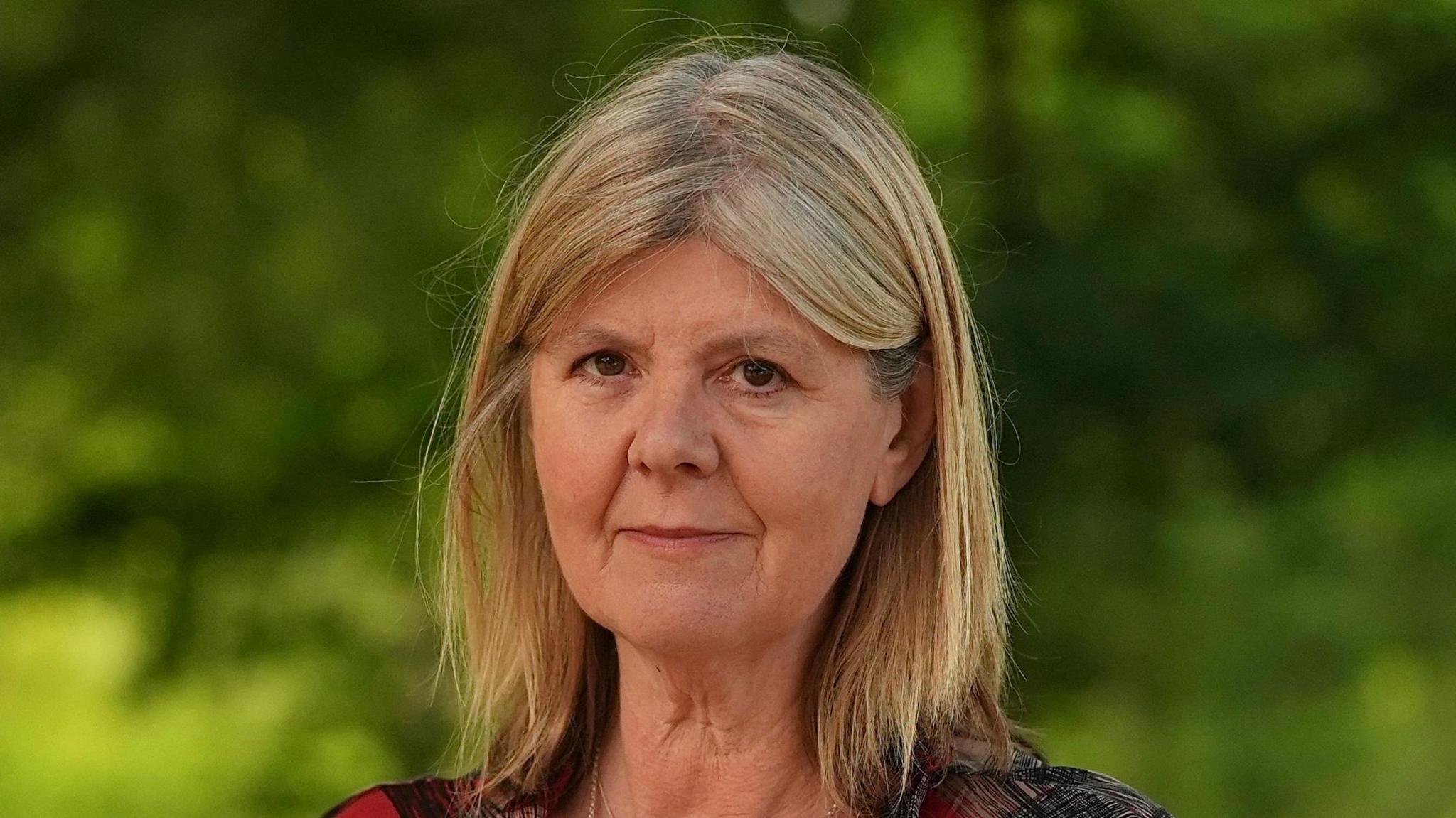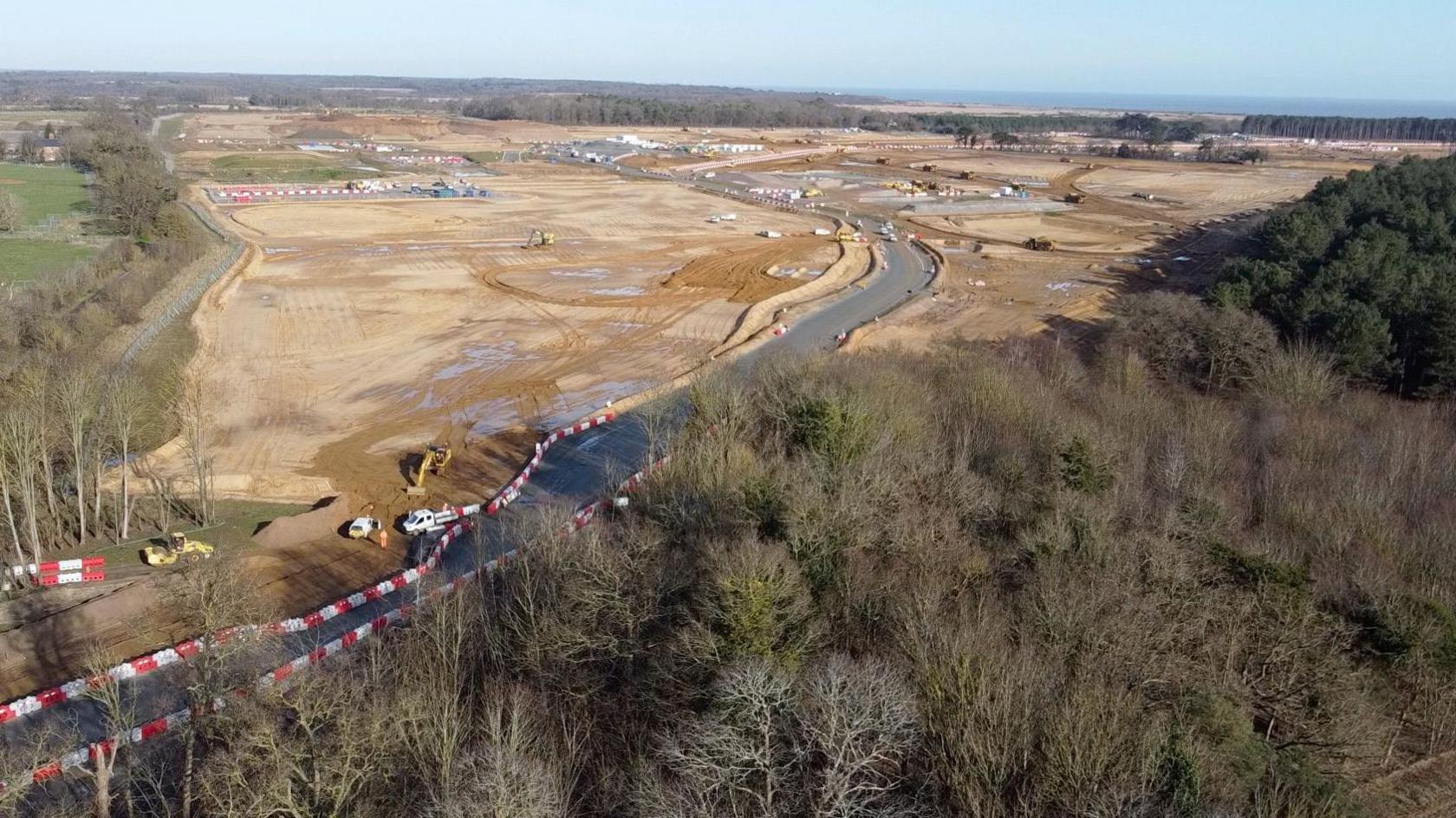Sizewell C nuclear power plant costs rise to £38bn

The Sizewell C nuclear power plant is expected to go live from the mid-2030s
- Published
The cost of building the Sizewell C nuclear power plant in Suffolk has jumped to £38bn, adding £1 a month to household energy bills for at least a decade.
The previous official figure for the project was £20bn, but the plant's joint managing director Julia Pyke said earlier estimates did not account for inflation or risk.
The government confirmed on Tuesday that it would take a stake in the power plant, and announced that it had secured investment from a number of businesses, including British Gas-owner Centrica.
The Sizewell C reactor is expected to begin operating in the mid to late 2030s, said Ms Pyke, after which she estimated home energy bills would be £2bn lower.
Ms Pyke said the nuclear plant would "cost consumers about £1 a month during the construction phase," adding up to a "small annual charge".
The government's stake in the project is 44.9%, while Centrica, EDF, La Caisse and Amber Infrastructure will also have holdings in exchange for funding.
Alison Downes, director of pressure group Stop Sizewell C, said the project had "only crawled over the line thanks to guarantees that the public purse, not private investors, will carry the can for the inevitable cost overruns".
She added: "It is astounding that it is only now, as contracts are being signed, that the government has confessed that Sizewell C's cost has almost doubled to an eye watering £38bn - a figure that will only go up."

Alison Downes of Stop Sizewell C predicted that costs would only go up
But Tom Greatrex, chief executive of the Nuclear Industry Association, said it was "money well spent" and the project would create "thousands upon thousands of good jobs".
Ms Pyke said Sizewell C's design is "85% copied" from Hinkley Point C in Somerset, which she said meant the Suffolk project would be cheaper to build.
Hinkley Point C is the first new nuclear power plant under construction in the UK since the 1990s. It was initially forecast to be operational by 2017 at a cost of £18bn.
It is not expected to be completed for a further four to six years following pandemic-related delays, and is set to cost around £46bn.
Mr Greatrex said Sizewell C was the first "true replica nuclear power station". He added it was "the best way to build faster and cheaper, and we must apply those lessons to a full programme."
Sizewell C is expected to create 10,000 direct jobs, thousands more in firms supplying the plant and generate enough energy to power six million homes, the Treasury said.
Energy Secretary Ed Miliband said: "It is time to do big things and build big projects in this country again and today we announce an investment that will provide clean, homegrown power to millions of homes for generations to come."

Large areas of land have already been cleared in preparation for Sizewell C
The ownership of the Sizewell C nuclear power plant will be:
UK government: 44.9%
La Caisse: 20%
Centrica: 15%
EDF: 12.5%
Amber Infrastructure: 7.6%
The project will be funded with a mixture of equity and debt - £8.8bn in equity from the government and the other investors, and £36.6bn in debt that will be provided by the National Wealth Fund (NWF).
Interest payments will be part funded by a levy on all electricity users of an estimated £1 per month for the decade-long construction phase.
The total debt and equity comes to over £45bn to allow for a buffer or contingency in case costs overrun. The NWF said it was unlikely it would need to provide the full amount of the loan.
France's export credit agency, Bpifrance Assurance Export, has also proposed a £5bn debt guarantee to back the company's commercial bank loans.
There are incentives for the company's owners to bring the project on or under budget, and protections to limit the private investors' exposure to going over budget. So if the project costs significantly exceed estimates, the government - and taxpayers - will be on the hook.
Despite the UK's strong nuclear legacy, including opening the world's first commercial nuclear power station in the 1950s, no new nuclear plant has opened in the UK since 1995, with all of the existing fleet except Sizewell B likely to be phased out by the early 2030s.
Sizewell C was one of eight sites identified in 2009 by Ed Miliband, when he was Energy Secretary in Gordon Brown's government, as a potential site for new nuclear. However, the project was not fully funded in the 14 years that followed under subsequent governments.
"The deal ends an era of dithering and delay to give Sizewell C the go-ahead that will help secure Britain's homegrown nuclear supply far beyond 2030," the Treasury said.
Douglas Parr, the policy director for Greenpeace UK, said the government had an "unswerving loyalty" to nuclear energy despite its costs.
"The only significant difference between the slowly unfolding economic blunder of Hinkley C and the forthcoming economic disaster of Sizewell C is that Hinkley's predictable construction problems, delays and cost overruns were borne by EDF," he said.
"EDF know they can't afford to make that mistake again, and so this time those costs will be borne by you, the British public."
Get in touch
Have you been affected by this story?
Follow Suffolk news on BBC Sounds, Facebook, external, Instagram, external and X, external.

What is Sizewell C and what does it mean for Suffolk?
- Published11 June
Sizewell C nuclear plant gets £14bn go-ahead from government
- Published10 June
Sizewell C boss 'optimistic' it will get go-ahead
- Published8 June
Sizewell C announces plan to build post-16 college
- Published29 May
EDF reject claims Sizewell C will cost £40bn
- Published15 January
Get our flagship newsletter with all the headlines you need to start the day. Sign up here.